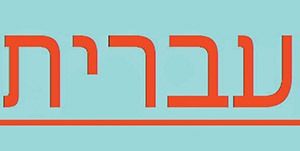
We have written about the importance of Hebrew literacy in day schools, and why Hebrew immersion should begin as early as possible (Jewish Link, February 12, 2015). Hebrew in America was an innovative program starting in Pre-K that was successfully implemented in many of our community’s day schools for several years. It was supported by grants from the federation, The Memorial Foundation for Jewish Culture, The AviChai Foundation, and the Covenant Foundation. It included a Hebrew-language summer day camp and intensive training for teachers. And there were different modules for non-native speakers. When the grants expired, however, the schools did not pick up the program, to the despair of the teachers. Children entering first grade at that time were fluent in Hebrew. Kindergarteners were helping their older siblings with their homework.
The program was pioneered by my colleague Shoshana Glatzer, and together we helped develop the Halav UDvash Hebrew language series. The program continued under the talented guidance of Dr. Drora Arussi until funding ran out, and she has been refining it ever since. MOFET International (The Jewish Portal of Teacher Education) will be presenting an online webinar to the global Jewish education community with Dr. Drora Arussi on a key part of the original Hebrew in America program Ivrit B’tnuah: Physically Internalizing a Second Language, on Wednesday, October 07, 2015, 10:00pm-11:30pm—Israel time. The free webinar in Ivrit will deal with the “Ivrit B’tnuah” technique and the principles of studying Hebrew by means of video clips that demonstrate the process interactively.
(http://mofetinternational.macam.ac.il/jtec/Pages/JTECWebinars/jtec-webinar-07-10-2015.aspx)
“Ivrit B’tnuah” is a language-teaching technique based on the research of Dr. James Asher—Total Physical Response (TPR), whereby children internalize and learn language by responding physically to verbs. In the same way as toddlers are taught to respond to basic commands such as “come,” “bring,” “stand,” “jump,” or “eat,” so “Ivrit B’tnuah” engages the student and encourages active learning.
Students develop reactive language before expressive language emerges. Second-language students of all ages experience Total Physical Response actively and respond to the spoken language. As a result, the students’ willingness to express themselves in the new language stems from comprehension rather than from meaningless rote learning. This means that the study of Hebrew commences with the infinitive of the verb so as to ensure ease of comprehension and speedy internalization.
Teachers should tune in individually, in groups, or as a school. This program works and there is no reason why it should not be introduced so that Hebrew language instruction can continue through the grades. Put simply, the level of Hebrew knowledge of our day school graduates is embarrassing. If schools can invest in technology and STEM programs, surely they can invest in our own literary and linguistic heritage.
Dr. Drora Arussi holds a BA in theater, an MA in the study of Judaism, and a PhD in educational management. She teaches Hebrew and has been writing syllabi for the study of Hebrew, Bible and worldwide Judaism for over 25 years. She coordinated Hebrew in America when she worked at federation’s Jewish Educational Services department.
The goal is the elevation of the Hebrew language as a core value in our Jewish educational institutions. The sooner that children become proficient in Hebrew, the easier it becomes for them to access the literary legacy of the Jewish people. Hebrew will become a portal to Jewish culture instead of a mere tool to study religious and devotional texts, or a vehicle to order a meal in an Israeli restaurant. We are in the business of creating educated Jews. The Hebrew language in all its variants from the Bible to the present—not just street Hebrew, is an essential tool for reading much of what Jewish culture has produced.
A very important feature of the community-wide effort to teach Hebrew was (and could still be) the creation of a Professional Learning Community. Workshops brought together teachers from all backgrounds and experience to learn from and share with each other. It might even catch on so that teachers from other disciplines could form their own PLC.
If principals want it to happen, it will happen. If it’s not important enough to be official school policy, then caring teachers can make it happen. Herzl’s motto “If you will it, it is no dream” was stated by our rabbis much earlier: “Nothing gets in the way of resolve.”
Soncino, ArtScroll, and the web have made everything available in translation. However, every translation is also an interpretation. It’s always second best. We owe it to our children not to have them be tourists in their own culture.
Rabbi Dr. Wallace Greene has had a distinguished career as a Jewish educator. He was a college professor, day school principal and director of two central agencies for Jewish education, including our own community’s Jewish Educational Services for over a decade. He is the founder of the Sinai School, and is currently a consultant to schools, and serves as Executive Secretary of The Alisa Flatow Memorial Scholarship Fund. He can be reached at [email protected].
By Wallace Greene








